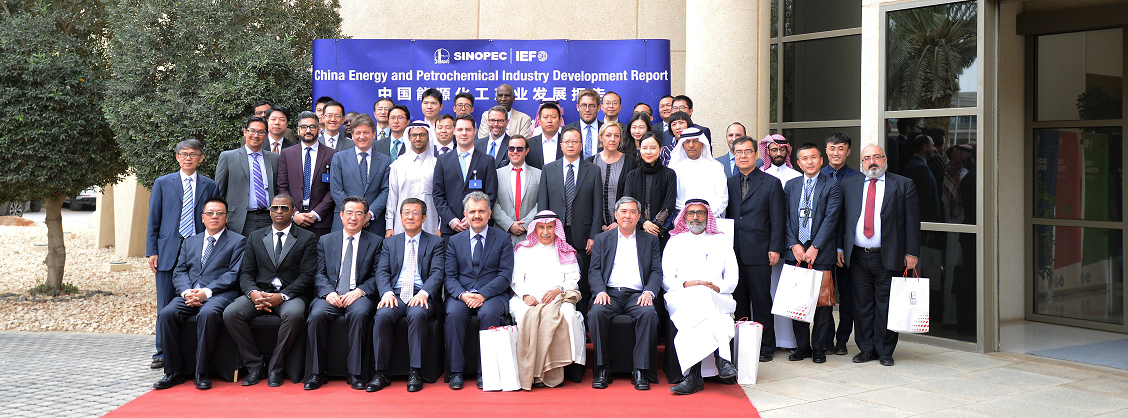IEF Lecture: Report of China Energy and Petrochemicals Industry 2019 by SINOPEC
Riyadh, Saudi Arabia
The Secretary General of the IEF, Dr. Sun Xiansheng welcomed SINOPEC delegates and members of industry, academia and the diplomatic community of Riyadh to an IEF Lecture on the "Report of China’s Energy and Petrochemicals Industry 2019" on 25 March 2019. The lecture was opened by Mr. Tao Wang, Deputy General Director of SINOPEC Corporate Culture Department and Mr. Li Xihong, Chief Representatives of SINOPEC in Saudi Arabia highlighting the significance of SINOPEC's operations to China, Saudi Arabia and the international community. China's "Belt and Road" Initiative and its benefit to the international energy sector was a prevalent theme throughout the presentations featuring the Review and Prospects for China’s Energy and Petrochemical Industry, China's Energy Transition and Development Path, China's Refinery Industry Outlook and Peak Oil Demand and New Horizons for the China's Petrochemical Industry.
Presenters included Ms. Jiao Yu, Vice President of SINOPEC Economics and Development Research Institute (EDRI); Dr. Zuoxian Luo, Deputy Director of Industrial Development Research Division and Senior Economist at SINOPEC EDRI; Mr. Xiaoming Ke, Deputy Chief Engineer and Director of Market Research and Mr. Xiaodong Lyn, Senior Analyst in SINOPEC’s Marketing and Research department.
The presentation began with a detailed analysis on the history, development and prospect for China’s petrochemical industry as a major player in the global energy supply chain. China’s increased refining capacity and natural gas production will allow it to further build its international network and deepen global partnerships. The demand for sustainable and advanced products in China is driven by urbanisation and rural vitalisation strategies, a rising middle class, coordinated regional development, technological advancements and the opening of China’s market offers greater potential for investment and encourages more sustainable development. China is expected to hit peak carbon emissions ahead of the rest of the world making sustainable development a top priority. Looking forward into 2019, China is forecasting a stable economic environment amidst a potentially volatile energy market with increased natural gas production despite lower oil and petrochemical demand.
The growth of non-fossil fuels in China’s energy mix and reduction of self-sufficiency rates means a greater dependence on foreign markets. For its part, China aims to lessen its demand of coal for power and embrace advancements in electrification and storage capacity. Crude oil demand is expected to increase due to decreased domestic production, lower oil prices and higher refining capacities. Given the growth of China's diverse import network, SINOPEC forecasts Chinese oil demand to peak in 2027 before giving way to a more diversified energy mix with the uptake of electrification and natural gas in the heavy transport sector. Natural gas demand has increased significantly particularly with the rise of LNG and technological advancements in renewable energy like solar and wind are expected to reduce costs and boost electricity generation.
A key point emphasised during the presentation was the increasing role of independent refineries and the potential to add more integrated and concentrated capacity to the market which would be targeted towards the export market. While oil demand for jet fuel and petrochemicals increases, moves toward greater efficiency, electrification and lower transport fuel consumption will also come to the forefront in China's energy mix. In 2018, China's sale of electric vehicles accounted for about 50 percent of global sales, making electric vehicles a dominant transportation option in the future.
The continued evolution of China’s petrochemical industry, especially considering the growth of ethylene and paraxylene capacity will be a trend to watch for the future. Although China may be the world’s largest market for petrochemicals, per capita consumption is rising slowly. Increasing urbanisation and evolving consumption habits create greater demand for plastics and polymer supply. China will still be required to import petrochemical products and have taken measures to reduce barriers for international trade. Further discussions focused on international investment, trade and efficiency measures to meet China’s growing potential in the industry.






